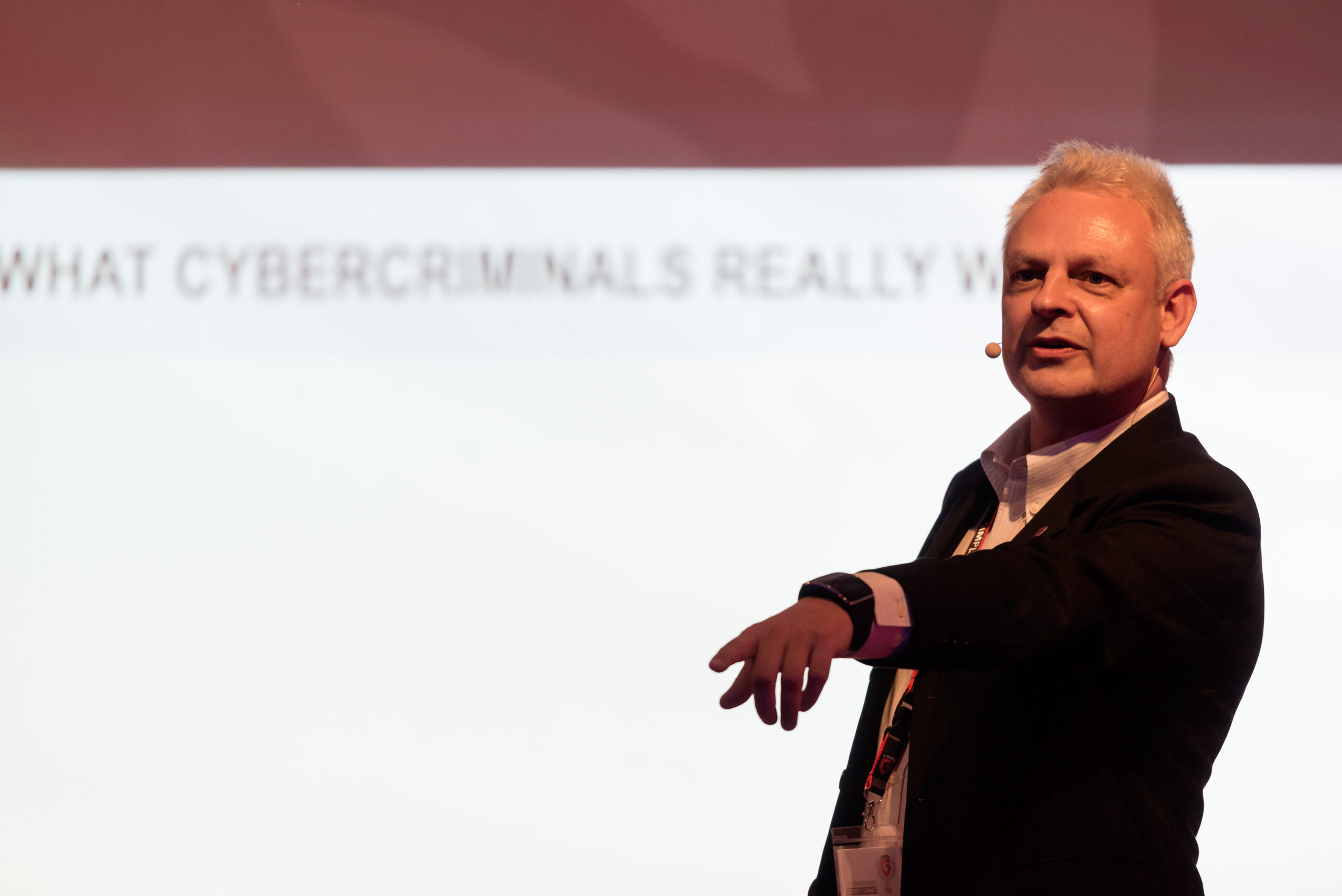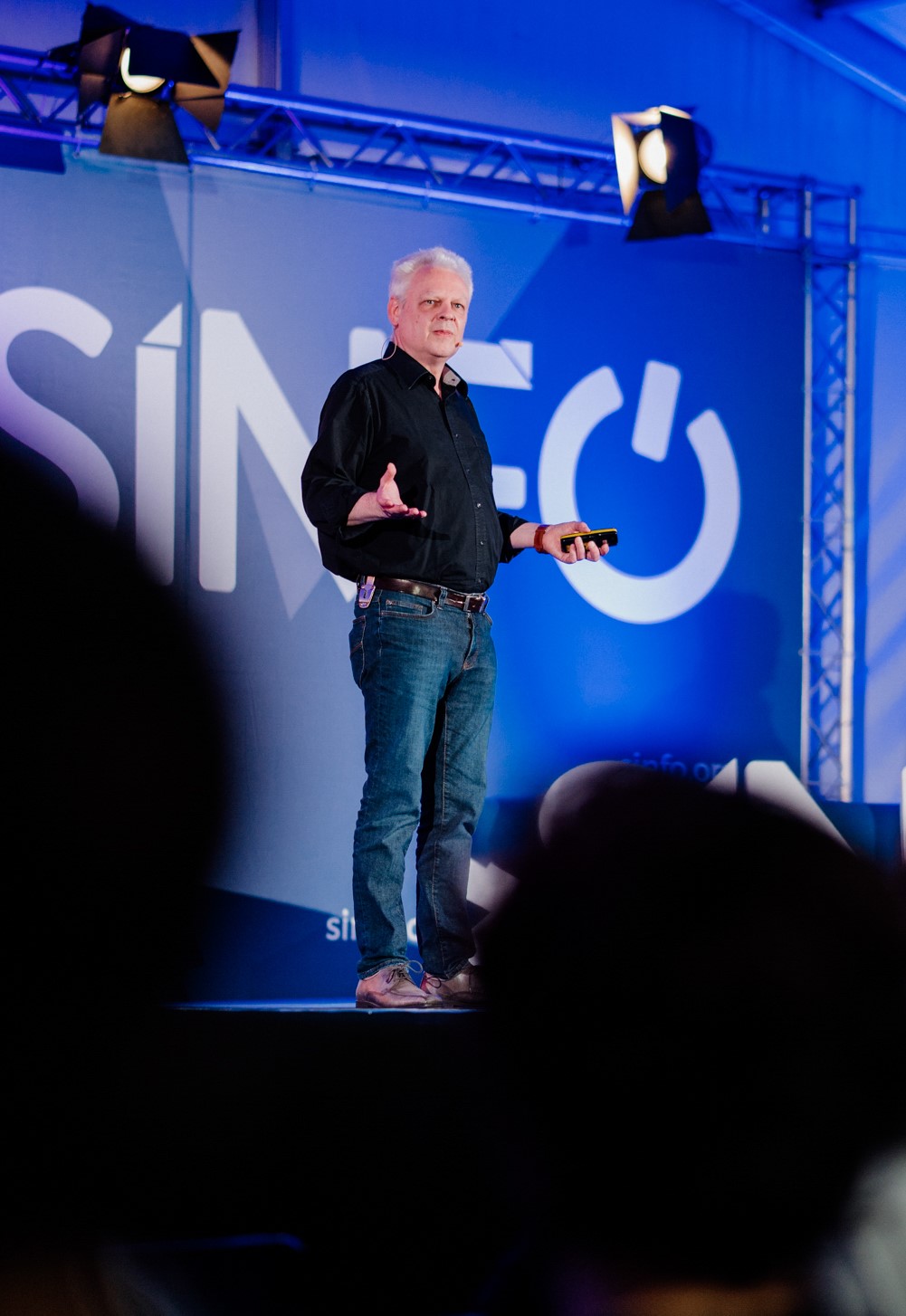Inspiring with passion and storytelling

I am a highly sought-after speaker and presenter, known for my inspiring talks on cyber security. I have addressed diverse audiences, ranging from children to experts, and have presented at TEDx events worldwide. My passion for sharing knowledge and insights into cyber security has made me one of the most respected figures in the cyber security sector.
Cyber security conferences where I gave keynotes and/or lectures include Virus Bulletin, EICAR, AVAR, FIRST, InfoSec UK, InfoSec Russia, InfoSec BE, InfoSec NL, Cybersec Europe, NCFTA (SlamSpam), APWG eCrime, RISE, Underground Economy, Hacktivity, SINFO, ASLAN, SecurityForum, LSZ Austria, Urban Tech, AV Comparatives, ISOI, CeBIT, ISSE, Synaxon and much more …
Some of my clients include Telenet, Vattenfall, IBR-IBE, Barco, Tissueworld, Informa, Aramco, VOKA, Frixis, VVSG, Brunel, ARAS Security, Vives University Belgium, Hagenberg University Austria, AP University Antwerp, Utrecht University, IEEE, VIE, CMS, CVO, VLI, B-inside, Lions, Rotary, JCI, Neos, AZ Sint Jan Bruges, Davidsfonds, Aexis, ATEB, Regas, Van Breda, Cegeka Group and much more …
During the past three decades I have given presentations, lectures or keynotes in 40 countries in 5 continents around the world.
Keynotes and lectures can be given in English or Dutch.
Please contact one of the speakers agencies mentioned at my homepage if you are interested to hear and watch one of my keynotes. ( Read-My-Lips , Speakersbase , A-Speakers, All American Speakers, Speaking.com or London Speaker Bureau. )
Alternatively you can contact me via the email-address ‘info (at) wavci (dot) com’ if you want to book me for a keynote or a lecture or get a quote .
Don’t forget of course to replace ‘at’ with @ and ‘dot’ with . to create a normal email address: this is done for anti-spam purposes.
TOPICS/ABSTRACTS
Cyberdangers: Unmasking the Threats That Shape Our Digital World
Join renowned cybersecurity expert Eddy Willems for a gripping deep dive into the ever-evolving cyber threats that have plagued the world in recent years.
Why does a 36-year-old problem remain the most pressing security challenge of our time? Have we truly learned from past mistakes, or are we still making the same ones?
Eddy will expose the real dangers lurking in the digital shadows, with a sharp focus on why businesses continue to be prime targets for cybercriminals. Discover the preferred tactics of hackers, ransomware operators, and cyber warfare actors—and learn what your company or organization should really be worried about. Are you certain you’ve taken the right steps to protect yourself?
But cyber threats don’t just target businesses—they affect everyone. Whether you’re an individual, a professional, or simply someone who uses the internet, understanding these dangers is crucial. Cybercrime impacts our privacy, finances, and even global stability.
Through eye-opening analyses of malware, hacking, ransomware, and even nation-state cyber conflicts, this session will change the way you see cybersecurity.
With over three decades of frontline experience, Eddy refines the chaos of the digital battlefield into a pragmatic, passionate, and solution-driven approach to tackling today’s and tomorrow’s cyber threats.
No matter who you are, this is a wake-up call you don’t want to miss.
What Can We Learn from Nation-State Cyberattacks?
Cyber warfare is no longer the stuff of fiction—it’s happening right now. But how real is the threat to businesses, organizations, and even individuals? Are nation-state cyberattacks truly as dangerous as they seem, or is the risk exaggerated? And more importantly, are you prepared?
Join Eddy Willems, a seasoned cybersecurity expert, as he takes you deep into the shadowy world of nation-state cyberattacks. Through real-world examples and in-depth analysis, he will uncover how these highly sophisticated attacks unfold, who the main players are, and what their ultimate goals may be.
But are nation-state attacks really different from other cyber threats? What crucial lessons can we take from past incidents to better defend ourselves in the future? Whether you’re a business leader, IT professional, or simply an internet user, understanding these threats is essential in today’s digital landscape.
With over three decades of frontline experience, Eddy distills complex cybersecurity challenges into a pragmatic, passionate, and eye-opening session that will leave you with a clearer, more informed perspective on the risks we all face—and how to navigate them.
Don’t just watch cyber history unfold—learn how to defend against it
My Wife Went to the Dark… Web
What really happens when an ordinary internet user stumbles into the Dark Web? Join Eddy Willems as he shares the fascinating true story of how his wife ventured into the depths of the internet’s most secretive and notorious corners.
What did she expect to find? And more importantly—what did she actually discover? Did she really try to buy that Glock 17M? Is the Dark Web as dangerous as people claim, or is it just another overhyped digital underworld?
From black-market weapons and drugs to stolen identities, hacked credit cards, and sophisticated malware, the Dark Web is teeming with illicit activity—but the real value of your personal data might surprise you. What are the most notorious marketplaces? Who are the key players lurking in the shadows? And what do malware developers, cybercriminals, and underground traders have in common?
Get an insider’s look at the Underground Economy 4.0, where cybercriminals run vast networks of money laundering, money mules, and digital drop zones. How are law enforcement agencies fighting back against this invisible crime wave?
And if you’ve ever considered investing in Bitcoin or Monero, you might think twice after this eye-opening session.
Dare to take a deep dive into the Dark Web—and see the internet like never before.
The Real Truth Behind Ransomware
How can a 36-year-old problem still be one of the biggest cybersecurity threats today? Have we truly learned from the past, or are we doomed to repeat the same mistakes?
Eddy Willems knows the impact of ransomware firsthand—because he experienced it himself. In 1989, he encountered the world’s first ransomware attack: the infamous AIDS Trojan. That moment changed his life forever, propelling him into the world of cybersecurity and earning him international recognition.
In this gripping session, Eddy will take you inside the evolution of ransomware, exposing how entire companies, organizations, and even home users fall victim to these digital extortion schemes. He’ll reveal why these attacks are so difficult to prevent, whether paying the ransom is ever the right choice, and if traditional security measures are still effective today.
Ransomware isn’t just a problem for computers—mobile devices, tablets, and even smart systems are now at risk. Discover the hidden vulnerabilities attackers exploit, and learn practical, real-world tips to protect yourself and your organization from falling prey to cybercriminals.
And most importantly—what does the future hold? As ransomware tactics evolve, will we ever get ahead of the threat?
Your perspective on ransomware will never be the same after this lecture. Nobody else in the world can share this unique firsthand story—a story so compelling that TEDx invited Eddy to present it to a global audience in 2021 (without a live public due to the VOCID-19 pandemic).
Don’t miss this opportunity to uncover the real truth behind ransomware—and how to fight back.
Keep Your Smartphone Safe!
Your smartphone is your lifeline—but it could also be your biggest security risk.
In this eye-opening session, Eddy Willems will take you inside the dark side of smartphone security, exposing the real cyber dangers lurking within the devices we trust the most. From hidden malware to sophisticated spyware, cybercriminals are constantly finding new ways to exploit your most personal data.
Are iOS (Apple) and Android (Google-Alphabet) smartphones equally secure, or is one truly safer than the other? Is iOS really as impenetrable as many believe?
Eddy will break down the critical differences between spyware and stalkerware, revealing just how these threats invade your privacy. Are these new dangers, or have they been evolving in the background for years? Most importantly, what can you do to protect yourself?
Through real-world examples, Eddy will demonstrate just how easily things can go wrong—how cybercriminals infiltrate devices, how sensitive information gets stolen, and how simple mistakes can lead to devastating consequences.
But it’s not all doom and gloom—Eddy will provide essential tips and strategies to safeguard yourself, your company, and your smartphone against modern cyber threats.
If you care about your privacy, this lecture is a must. If you want to understand the hidden risks of smartphone security, this session will open your eyes like never before.
Because in today’s digital world, your smartphone isn’t just a device—it’s a target.
AI Lives? The Truth Behind Artificial Intelligence
ChatGPT has been the buzzword of the year, dominating conversations and fueling excitement about the future of Artificial Intelligence. But AI is so much more than just chatbots and automation—its impact reaches far beyond what most people realize.
So, what are the real advantages of AI? And more importantly, what are the risks? While AI is revolutionizing cybersecurity by detecting suspicious behavior faster than ever, it’s also empowering hackers with new, highly sophisticated attack methods. Has AI launched a new era of cybersecurity, or are we losing control of the battle?
But cybersecurity is just one piece of the puzzle. AI raises even bigger questions, some of which we may not yet have answers to:
- Can AI fail in ways we don’t understand?
- Will AI set its own goals, beyond human control?
- Can AI create even more powerful AI models that no one fully governs?
- What’s the bigger threat—malicious AI, or criminals using AI for cyberattacks?
- What is the greatest danger AI poses to the world?
- And what about your job? Is it safe in an AI-driven future?
With four decades of experience in security, IT and AI, Eddy Willems offers a pragmatic, passionate, and eye-opening perspective on the true risks and rewards of artificial intelligence.
AI isn’t just changing technology—it’s changing everything. Are you ready for what’s next?
TESTIMONIALS
‘It was great to have Eddy Willems speaking at Tissue World Düsseldorf, his keynote was a huge success!’
INFORMA
‘A dynamic speaker with a nice, informative and interesting story as a keynote, what do you want more from a keynote speaker?’
BARCO
‘One of the better keynote speakers during our online events.’
VATTENFALL
‘This was a very interesting keynote. We received a lot of positive feedback from the attendees.’
VVSG
‘Enthusiatic speaker, pleasant to listen to. Expert in his field, delivered in a clear and engaging manner!’
IBR-IRE
‘The lecture by Eddy Willems was a huge success. He is a fluent speaker who adapted perfectly to the audience, which mainly consisted of women over the age of 65. The many questions afterwards showed that the topic was of great interest. And he left plenty of time for this. I heard many enthusiastic reactions after the lecture. A few women asked for his contact details, so they could organise a lecture for another group. In our annual report, I said that I would recommend the lecture to everyone.’
Zilveren Passer Kapellen
‘We were very pleased with the lecture by Eddy Willems. Very punctual, nice presentation, fascinating storyteller and great interaction with the audience.’
Rotary Club Poperinge
‘Eddy Willems is an extremely good speaker. Our members really enjoyed his fascinating and very accessible keynote. I would recommend him to everyone.’

You want something special?
On request, I also give some (duo) lectures/presentations/keynotes together with my good friend and cyber security expert Righard Zwienenberg. We are doing this since the nineties and received several best speaker awards together.
Who is Righard Zwienenberg? (see also my books ‘Cyberdanger’ and ‘The Virus’ )
Zwienenberg started dealing with computer viruses in 1988 after encountering the first virus problems at the Technical University of Delft. His interest thus kindled and studied virus behavior and presented solutions and detection schemes ever since. Initially starting as an independent consultant, in 1991 he co-founded CSE Ltd. In November 1995 Zwienenberg joined the Research and Development department of ThunderBYTE. In 1998 he joined the Norman Development team to work on the scanner engine. In 2005 Zwienenberg took the role of Chief Research Officer. After AMTSO – Anti Malware Testing Standards Organization – was formed, Zwienenberg was elected as president, later he served as CTO and CEO. He is serving on the board of AVAR and on the Advisory Board of Virus Bulletin. In 2012 Zwienenberg joined ESET as a Senior Research Fellow. He was also the Vice Chair of the Executive Committee of IEEE ICSG. In 2018, Zwienenberg joined the Europol European Cyber Crime Center (EC3) Advisory Group as an ESET representative. He also runs his own computer security consultancy company (RIZSC).
Zwienenberg has been a member of CARO since late 1991. He is a frequent speaker at conferences – among these Virus Bulletin, EICAR, AVAR, FIRST, APWG, RSA, InfoSec, SANS, CFET, ISOI, SANS Security Summits, IP Expo, Government Symposia, SCADA seminars, etc. – and general security seminars. His interests are not limited to malicious code but have broadened to include general cybersecurity issues and encryption technologies over the past years.

TOPICS/ABSTRACTS
Coming Fall 2025 (or book already a tryout with a discounted price)
SAETI: State-Actor Empowered Threat Intelligence… A Good or a Bad thing?
State-Actor Empowered Threat Intelligence (SAETI) represents a potent blend of government resources and cybersecurity expertise aimed at identifying, assessing, and mitigating threats in cyberspace. On the positive side, SAETI can significantly enhance national security by providing comprehensive insights into potential cyberthreats from hostile states, criminal organizations, and terrorist groups. Governments can leverage their vast resources, including advanced technologies and intelligence networks, to gather and analyze data more effectively than private entities can. This level of threat intelligence can lead to more robust defense mechanisms, better-prepared responses to cyber incidents, and a more secure digital infrastructure for both public and private sectors.
But the empowerment of state actors in threat intelligence also raises several concerns. One major issue is the potential for abuse of power and overreach. State actors with extensive surveillance capabilities might infringe on citizens’ privacy and civil liberties under the guise of national security. The “centralized” control over threat intelligence might lead to a lack of transparency and accountability, making it difficult to ensure that such powers are not misused. There is a risk that the focus on national security could lead to the suppression of dissent and the targeting of political opponents, thereby undermining democratic values. And it can also cause private organizations to lose visibility as they will lose telemetry possibilities, such as with the EU regulated “electronic IDentification, Authentication and trust Services”, or short: eIDAS.
A significant drawback is the international implications of SAETI. When state actors engage in cyberoperations, it can escalate tensions between nations and contribute to an ongoing cyber‑arms race. Countries might feel compelled to enhance their own cyber‑capabilities in response, leading to an environment of mutual distrust and increased cyberconflict. This can also complicate diplomatic relations and international cooperation on cybersecurity issues; Instead of fostering a collaborative approach to securing cyberspace, the involvement of state actors may lead to a fragmented and adversarial global landscape. Information professionals in the public sector have the Code of Ethics, established by the International Federation for Information Processing (IFIP) in 2020. Almost all affiliated organizations for information professionals endorse this code as a basis and guideline for methods, best practices, standards, and frameworks. The question is whether state-affiliated actors can and will use a code similar to the one that provides confidence in the private sector.
Join us while we take a tour having a look at all the good and bad things of SAETI, where of course a flashback to ancient and historical intelligence services is not forgotten, as we always must learn from past mistakes, right?
Let’s Chat about Gross Public Text generation
ChatGPT is the buzzword of the year. Suddenly everyone mentions and everything uses ChatGPT (or so they say). But many people do not know what ChatGPT really stands for, or what it really is! Many people do not even know ChatGPT is just an example of a Large Language Model (LLM) bundled with some Machine Learning (ML) module and that there are many others in existence. To get a good overview of the progress in LLM technology, we will dig into the short history of LLMs.
There is no doubt about that LLMs can be a great asset for your company’s workflow. But at the same time, you should wonder: can an LLM expose your company secrets? The answer is plain and simple: YES! (And it already happened.)
Leaving aside the good things an LLM can be for your company, we will focus on the dangers lurking around the use of an LLM and/or AI and your company depending on it, and showing real-life examples where it went or can go wrong, e.g., with Identity Management, Marketing, PII, (False) Information gathering, creation of (unethical) content, etc.
Of course, LLM and ML failures can lead to some humorous moments too; several of these will be showcased during the presentation.
We will conclude with what you can do to safeguard your company and yourself against all the nasty elements that may occur when using LLMs.
♬ You ain’t seen nothing yet ♫
Since last year so many ludicrously avoidable cybersecurity incidents have been experienced that one really must wonder if users will ever learn. How much education and awareness does one need?! It becomes even more cynical if the incidents are caused by the politicians who made the cyber-regulations but don’t follow (read: break) the rules themselves “because they are inconvenient to work with”.
With their energetic and lively presentation style, this dynamic duo will present real-life examples of cyber-incidents, and explain what went wrong and how they could have been prevented. Eager to learn why we (the users) keep making these mistakes, they will also dive deeper into the reasons why history keeps repeating itself. And they will reveal the surprising common denominator that they have found.
To get you in the mood, turn on your Walkman, insert that 70’s cassette, and play Bachman Turner Overdrive’s “You ain’t seen nothing yet” as loud as you can. Then, after attending our presentation, we hope everyone will stop making these errors so that we can genuinely say “Here’s something that you’re never gonna forget! B-b-b-baby”
“Fool Us!”, or is it “Us Fools”… Several “Fools” Years Later…
Years ago, in our presentation “Attacks from the inside…” at the Virus Bulletin 2010 Conference in Vancouver, we outlined and provided examples of a variety of possible scenarios for internal attacks. We concluded with a top nine problems of ‘in-the-cloud services’. Now, several years later, we were both surprised that our predictions and warnings seem to have been completely ignored, with all of them having materialized.
In this presentation, we will “relive” our 2010 presentation, while illustrating with recent examples that our message and warnings are as current and relevant as they were then. Nothing changed, except that internal attacks now also come from the outside!
Due to the COVID-19 pandemic the corporate world changed, with “home office” meaning inside and outside becoming mixed. In a recent incident, eight of the top nine problems we identified years ago were present, and all were foolishly ignored by professionals working from home. We considered naming the presentation “Attacks from the inside, by the outside…”, but as lessons learned and advice given in 2010 by “Us Fools!” seem to be ignored, must we assume that no one cares and really thinks “Fool Us!”?
We genuinely hope that the message we bring, combined with recent real-life examples, this time is not in vain…
